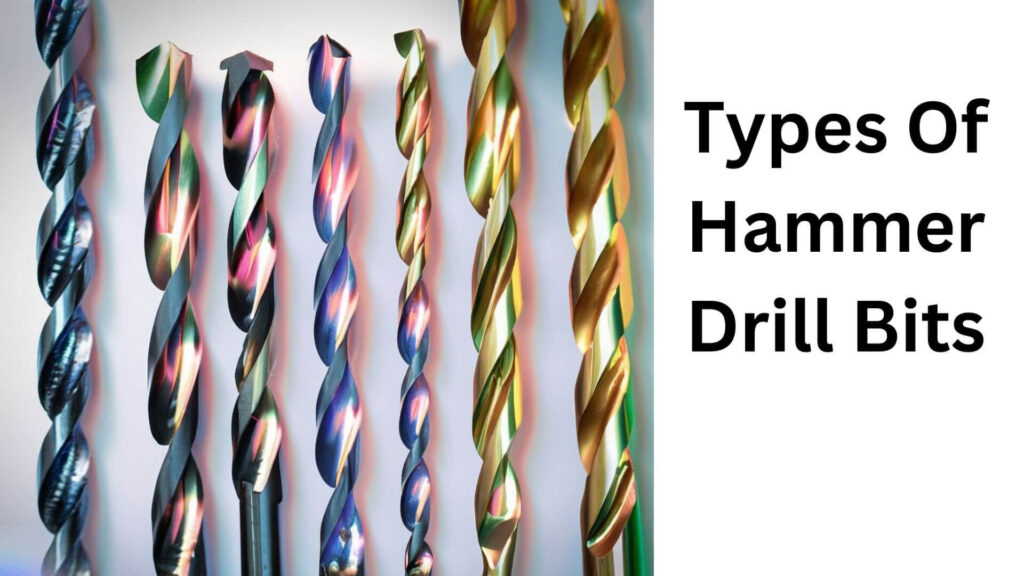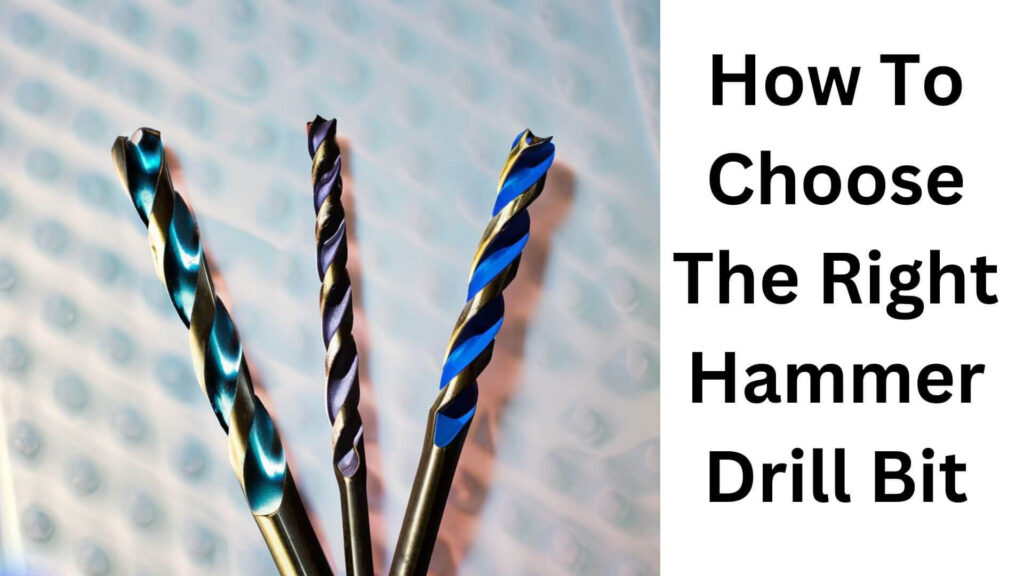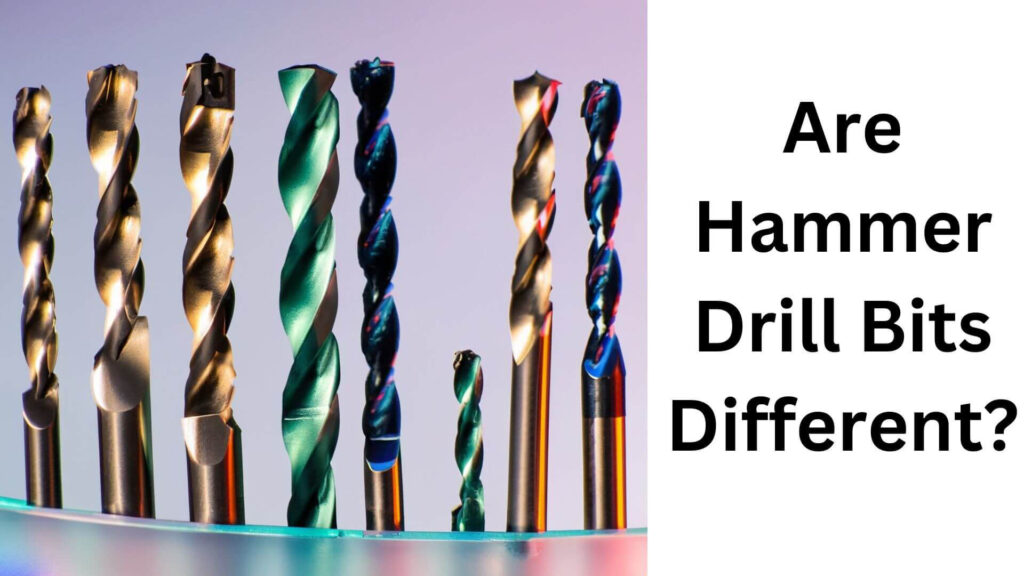When it comes to drilling into tough materials like concrete, brick, or masonry, having the right tools is crucial. Hammer drill bits are designed for specific applications that require a different approach than regular drill bits.
In this blog post, I’ll explore the differences between hammer drill bits and regular drill bits, the types of hammer drill bits available, and how to choose the right one for your project. I’ll also discuss common mistakes to avoid when using hammer drill bits and how to maximize their effectiveness.
Table of Contents
Hammer Drill Bits Vs. Regular Drill Bits
Before diving into the various types of hammer drill bits, it’s essential to understand how they differ from regular drill bits.
Construction and Design
- Hammer Drill Bits: These bits are specifically designed to withstand the percussive action of a hammer drill. They typically feature a carbide tip that is hard enough to penetrate tough materials, such as concrete and brick. The flute design is optimized to remove dust and debris efficiently, allowing for more effective drilling.
- Regular Drill Bits: Standard drill bits, usually made from high-speed steel (HSS) or carbon steel, are intended for softer materials like wood, plastic, and light metal. They lack the robust construction needed to handle the additional force of a hammering action and are generally not designed to penetrate hard surfaces effectively.
Mechanism of Action
- Hammer Drill Bits: When used in a hammer drill, these bits combine rotational motion with a rapid hammering action, allowing them to break through hard materials more effectively.
- Regular Drill Bits: In contrast, regular drill bits rely solely on rotational motion. They don’t have the capacity to deliver the extra impact force required for drilling into hard surfaces.
Applications
Regular Drill Bits: Ideal for everyday drilling tasks involving softer materials, such as wood, drywall, or thin metal.
Hammer Drill Bits: Best suited for masonry, concrete, and brick applications. They are essential for construction and renovation projects that involve hard materials.
Types Of Hammer Drill Bits

Understanding the different types of hammer drill bits can help you choose the right one for your project. Here are some common types:
- Masonry Bits: Designed specifically for drilling into concrete, brick, and stone. These bits usually feature a carbide tip and a spiral flute design for efficient dust removal.
- SDS Bits: SDS (Slotted Drive System) bits are designed for use with SDS hammer drills. They have a specific shank design that allows for quick changes and better transfer of energy during drilling.
- SDS-Plus and SDS-Max: These are subcategories of SDS bits. SDS-Plus bits are smaller and suitable for lighter work, while SDS-Max bits are larger and meant for heavy-duty applications.
- Carbide-Tipped Bits: These bits have tips made from carbide, making them extremely hard and durable. They are effective for drilling into very tough materials.
- Tapered Bits: Used for drilling larger holes, tapered bits are ideal for creating holes for anchors and dowels in masonry.
Check Also: Best Hammer Drill Under Your Budget.
Which Types Of Bits Are Suitable For Different Projects And Materials?
Choosing the right hammer drill bit depends on the material you’re working with and the type of project you’re undertaking. Here’s a breakdown of suitable bits for various applications:
Metal: Hammer drill bits are not suitable for metal; instead, use cobalt or titanium-coated bits designed for metal drilling.
Concrete: Use masonry bits or SDS bits specifically designed for concrete. Carbide-tipped bits work well for tougher applications.
Brick: Similar to concrete, masonry bits are ideal. Ensure you select bits with a carbide tip for durability.
Stone: For natural stone, opt for carbide-tipped bits. If you’re working with softer stones, standard masonry bits may suffice.
Cinder Blocks: Masonry bits or SDS bits can be used effectively. Select a bit with a diameter suited to the hole size you need.
Tiles: When drilling into tiles, use diamond-tipped bits. Regular hammer bits can crack tiles, so proceed with caution.
Read More: How to Put a Bit in a Hammer Drill
How To Choose The Right Hammer Drill Bit

Selecting the appropriate hammer drill bit can make all the difference in your project’s success. Here are some tips to help you choose wisely:
Quality: Invest in high-quality bits. Cheap bits can dull quickly and may break during use, leading to frustration and increased costs.
Material Compatibility: Ensure the bit is suitable for the material you’re drilling into. Always opt for carbide-tipped bits for hard surfaces.
Bit Diameter: Choose a bit diameter that matches the size of the hole you need. It’s wise to have a variety of sizes on hand for different projects.
Shank Type: Make sure the bit’s shank is compatible with your hammer drill. Common shank types include SDS-Plus, SDS-Max, and regular round shanks.
Length of the Bit: Consider the depth of the hole you need to drill. Longer bits are necessary for deeper holes, while shorter bits are suitable for surface-level work.
Read More: Can I Use Hammer Drill Bits in Normal Drill?
Common Mistakes When Using Hammer Drill Bits
Even experienced DIYers can make mistakes when using hammer drill bits. Here are some common pitfalls to watch out for:
- Using the Wrong Bit: Using a hammer drill bit on materials it’s not designed for (like wood or metal) can lead to damage and ineffective drilling.
- Insufficient Pressure: Failing to apply enough pressure can cause the bit to spin without cutting effectively, leading to overheating and dulling.
- Neglecting Cooling: Continuous drilling without breaks can overheat the bit and the drill, reducing their lifespan.
- Improper Speed Settings: Not adjusting the drill speed according to the material can result in poor performance and potential damage.
- Forgetting to Clear Debris: Not clearing the drill hole of dust and debris can lead to overheating and increased resistance while drilling.
How To Avoid These Mistakes And Get The Most Out Of Your Hammer Drill Bit?
To ensure you get the best performance out of your hammer drill bits, consider the following tips:
Maintain Your Bits: Regularly check the condition of your hammer drill bits. Replace them as needed to ensure effective drilling.
Select the Right Bit for the Job: Always choose bits that are designed for the specific material you are working with.
Use Proper Pressure: Apply steady pressure without forcing the drill. Allow the bit to do the work.
Take Breaks: Allow your drill and bit to cool down during extended drilling sessions to prevent overheating.
Adjust Speed Settings: Use lower speeds for harder materials and higher speeds for softer materials to optimize performance.
Clear the Hole Regularly: Stop periodically to clear out dust and debris, which will improve the efficiency of your drilling.
Read More: Can a Hammer Drill Be Used As a Regular Drill?
Frequently Asked Questions On Are Hammer Drill Bits Different?
What Are Hammer Drill Bits?
Hammer drill bits are specialized bits designed to be used with hammer drills. They combine rotational and hammering actions to penetrate hard materials like concrete and masonry.
Can Regular Drill Bits Be Used In A Hammer Drill?
While you can technically use regular drill bits in a hammer drill, they are not designed for that application and may become damaged or ineffective when drilling into hard materials.
How Do I Choose The Right Hammer Drill Bit For My Project?
Consider the material you are drilling into, the diameter and length of the hole required, and ensure the bit has a compatible shank with your hammer drill.
What Is The Proper Way To Use A Hammer Drill Bit?
Use steady pressure, adjust speed according to the material, and take breaks to avoid overheating. Always choose the right bit for the job.
Latest Opinion
In conclusion, understanding the differences between hammer drill bits and regular drill bits is essential for anyone engaged in DIY projects or construction work. Hammer drill bits are specialized tools that allow for efficient drilling into hard materials, and knowing which type to choose for your specific project can save you time and frustration.
By avoiding common mistakes and following best practices, you can maximize the performance and lifespan of your hammer drill bits. Investing in quality tools and maintaining them properly will yield the best results, making your drilling projects more successful and enjoyable.

Hey, I am MD Hrithik Hossain, I’m a huge fan of DIY crafts. My workshop is where I spend most of my spare time, and I’m always working on some project. To that end, I’d like to share some of my knowledge and experience with you in power tools, woodworking, and other specialized materials fabrication.
I will guide you with genuine knowledge that can assist you with deciding whether a drill is appropriate according to your requirements or not. If you want to find the best drill and know which type of drill is most suited for your needs, then I can guide you with my expertise. My passion lies in helping others find the correct products they need at an affordable price.


